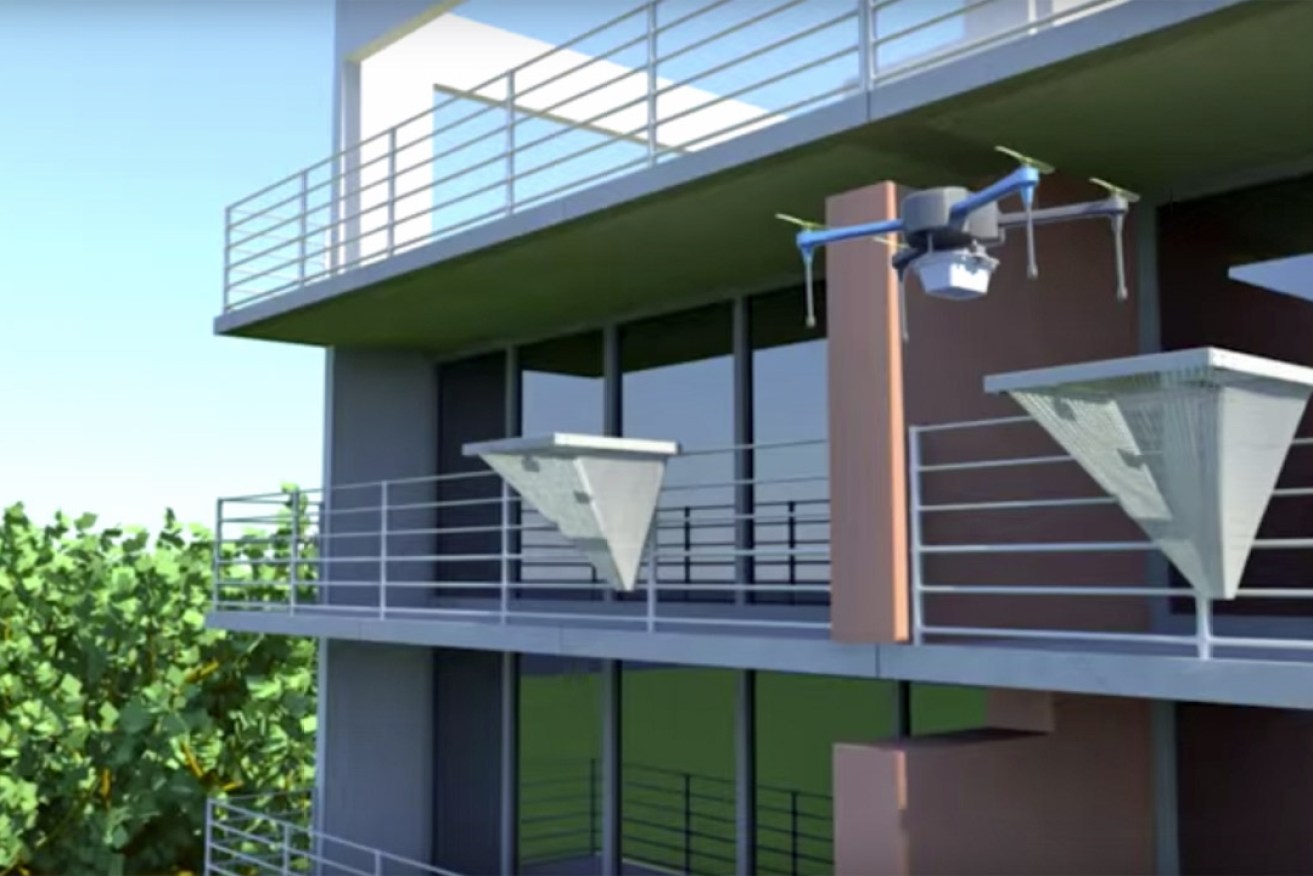Futuristic delivery drone on its way to SA
A drone system to deliver packages – and possibly even fast food – is coming to South Australia, but a change in federal laws will be needed to get the idea get off the ground.


A freeze-frame from an animation demonstrating how BLKTATU works. Image: supplied.
When Internet giants Google and Amazon began developing drones to make futuristic flying delivery services a global reality, Clinton Burchat realised both of the companies’ designs contained an obvious flaw.
Google’s drone would drop packages from a string – requiring someone to receive the package in person – while Amazon’s drone was to land on the ground, needing a fair amount of space and a secure area in which to drop the package.
“Both of these solutions are no good if you don’t have a … large area to accept deliveries,” Burchat tells InDaily.
So he approached electronics engineer Grant Bajema and together they developed a prototype that solves the problems.
It’s a delivery system attached to the bottom of a drone to hover over a net, which would be attached to the side of a house, apartment or vehicle.
The drone then drops the package into the 70cm x 70cm collapsable net, which is funnelled into a secure, lockable box. No need for collection by a person at the time, and very little space required.
The idea had some early success, coming fourth out of more than 1000 entries from 165 countries in the 2015 international Drones For Good competition in the United Arab Emirates – notably, beating entries from the Massachusetts Institute of Technology (MIT) and the University of Singapore.
Now, Burchat and Bajema have won $10,000 to develop their product and travel from their Queensland base to South Australia, to present the drone delivery system – called BLKTATU (pronounced “black tattoo”) – to judges in the Adelaide to Zero Carbon Challenge.
(They did want to name it SkyNet – see video below – but couldn’t because the trademark is associated with the Terminator movies.)
The competition aims to attract innovations from around the country to help meet the State Government’s objective of making the City of Adelaide the world’s first carbon neutral city.
The drone delivery model would reduce carbon emissions by replacing diesel-powered trucks in traffic with small, battery-powered drones that can travel as the crow flies.
But the State Government has no control over federal laws that prevent drones from flying beyond an operator’s line of sight, which would, in turn, prevent the idea from getting off the ground in SA. Other regulations prohibit dropping projectiles from aircraft – or 200-gram packages, in this case.
Burchat says he has no plans for an Uber-style, large-scale civil disobedience campaign to force the Government’s hand.
Instead, he’s relying on the lobbying efforts of his heavyweight competitors, Google and Amazon, to persuade federal legislators of the need for change.
“I’m letting them do their thing and hoping to jump on the back of that,” he says.
“With Uber, I think there was a grey area [in the law].
“There’s no grey area with drones.
“It’s very clear that you have to keep it within personal line of sight – you can’t even use binoculars.”
Burchat hopes for a change in legislation within the next two years.
Failing a change in Australian law, he says he would look to establish BLKTATU as a fully-fledged business in Malaysia, a country that lacks such restrictions.
But a win at the Zero Carbon Challenge could mean tacit State Government support for a change.
“The relevant regulations around drones, which are administered by CASA [Civil Aviation Safety Authority] in Australia, currently do not allow for drones to be operated out of line-of-sight to the operator,” a State Government spokesperson told InDaily.
“The regulations are anticipated to evolve with technology and as a forward-looking competition, the judges have taken this into consideration.
“The future of drones is a fascinating area with a lot of potential for low carbon cities.”
As a condition of entry in the Zero Carbon Challenge, each applicant based outside the state must partner with a South Australian entity, or be willing to find a local partner.
Burchat says his business model would rely either on a monthly subscription fee of a minimum number of orders with the net thrown in for free.
He says the system could easily be adapted to the pickup and delivery of fast food, and he plans to branch into larger drones that could carry 5kg packages.
Burchat hopes that if and when a fast food chain like McDonald’s wants to start drone deliveries, they might engage BLKTATU instead of designing a new drone delivery system from scratch.
“We can deliver mail as well – no problem.”
He also envisions a future where massive drones could be used to pull shipping containers off moving ships onto shore.
And: “Next up, we’re going to develop an automatic loading system … from point A to point B”.
“It wouldn’t need human intervention [at either end].”
He said any winnings from the competition would help boost the development of the prototype and the automatic pickup system.
Solstice Media has partnered with the South Australian Government to provide information about the transition to a low-carbon economy.




